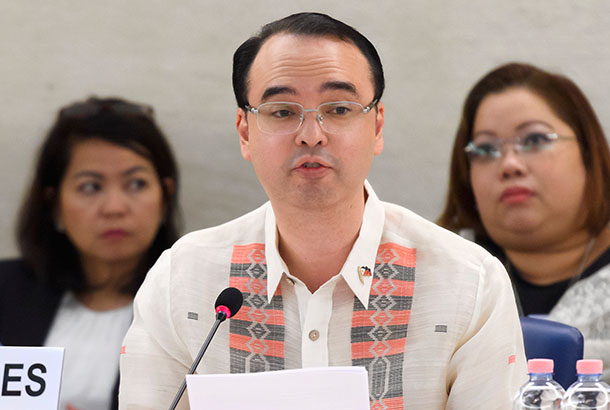Cayetano: Rejecting conditional foreign aid 'a policy to all countries'

In a chance interview, Foreign Affairs Secretary Alan Peter Cayetano said the new policy on accepting foreign aid came from President Rodrigo Duterte himself, adding that such a move would not make Filipinos who need assistance suffer. Fabrice Coffrini/AFP
MANILA, Philippines — The Philippines’ fresh policy of rejecting foreign grants with conditions attached applies to all aid-giving countries, Foreign Affairs Secretary Alan Peter Cayetano said Wednesday.
In a chance interview, Cayetano said the new policy on accepting foreign aid came from President Rodrigo Duterte himself, adding that such a move would not make Filipinos who need assistance suffer.
His remarks came after the government announced it will reject new assistance from the European Union to stop the bloc’s perceived meddling in Manila’s internal affairs.
“I cleared it with the president last night. It is the policy to all countries. If you're going to give us conditionalities that will affect our sovereignty to give you the right to interfere into our domestic affairs, we will not accept that donation,” the country’s top diplomat said.
“Now questions, will the people not suffer? No, because you can give it directly to the people. So for example, the US, they use the international organizations, even EU gives some of the money to the International Red Cross,” he added.
“So just because we will not take something that is with conditionalities, that doesn't mean our people will be hurt.”
The EU has been a strong critic of Duterte's anti-drug campaign, which has taken the lives of more than 3,900 suspected drug personalities.
Human rights watchdogs said most of the fatalities are extrajudicial killings committed by cops and unknown assailants—a claim that the government has vehemently denied by insisting that police are only killing in self-defense while gangsters are silencing potential witnesses.
Citing police data and Duterte’s remarks “encouraging” cops to take “aggressive approach” on drug suspects, EU this week released a report flagging the worsening “respect for the right to life, due process and the rule of law” in the Philippines during the second half of 2016.
Cayetano said he recently had a “very frank and honest” meeting with EU officials who gave an assurance that the bloc was not interfering in the country’s autonomy.
Cayetano also said the Philippines is open to any help that Europe might offer in rebuilding the battle-scarred city of Marawi as long as the assistance is not tied to any conditions.
“Well, it was a long meeting and of course nagkapaliwanagan about ito ang stand nila, hindi naman sila nakikialam,” he said.
“So the question should now be addressed to EU. Are they willing to give without conditionalities or if the conditionalities are there, are they willing to do it through international organizations?” he added.
“So hopefully kung maganda ang usapan ng EU and President Duterte then it'll be a giant step forward but there are real issues that have to be resolved.”
The European Commission recently pledged to provide €850,000 or about P49 million in humanitarian aid for Marawi evacuees. EU funding will mostly focus on the provision of food, water supply, healthcare, hygiene kits, sanitation facilities and essential household items.
To recall, the Philippine government early this year said that it would turn down aid from the EU days after China promised to pour in billions of dollars to fund Duterte’s ambitious infrastructure plan.
But Economic Planning Secretary Ernesto Pernia later said the decision to reject EU grants was “not a policy,” adding that Duterte, who is known to flip-flop on his statements, might "take back" his remarks soon as this could only be driven by "reaction."
READ: Philippines ends P13.8-B funding from European Union | Duterte may reverse decision to reject EU aid, Pernia says
In 2014, the Philippines was granted beneficiary country status under the General System of Preference (GSP+) — a preferential trade deal that allows 6,200 of its products to enter the EU market duty free.
However, the alleged cases of extrajudicial killings in the country as part of Duterte’s drug war has put at risk the country’s GSP+ privileges.
The country’s beneficiary status under the GSP+ necessitates the implementation of the 27 international treaties and conventions on human rights, labor rights, environment and governance.
Results of the latest GSP+ review is expected to come out in January next year.
READ: 'No surprises' for Philippines, EU says, as results of trade perks review loom
- Latest
- Trending































